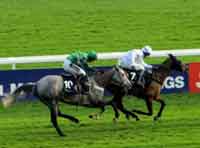

How Jockeys Stay in Shape for Horse Racing
Enda McElhinney provides insight into how jockeys maintain their fitness and weight.
Jockeys in horse racing live by some of the most demanding lifestyles and training regimes across any sport. The lightweight riders have to stay in complete control of their weight. Otherwise, they will be too heavy for their ride, jeopardising their future in the sport. In national hunt racing, jockeys must jump over hurdles or fences with their horse. They often pick up injuries that rule them out of the sport for some time - but even during rehabilitation, they must keep their weight down. Otherwise, they can delay their return to action.
The two biggest races on the national hunt calendar are the Cheltenham Gold Cup and the Grand National, where Rule the World was successful in April 2016. Here is how the best jockeys prepare and stay in shape for these prestigious races.
A Disciplined Diet
The proper diet is crucial for all jockeys in horse racing, but even more critical for those who will line up at the Cheltenham Festival in March, the sport's biggest week of the year. If they overeat, they could miss their ride to the meeting.
Tom Scudamore, for example, is scheduled to partner Thistlecrack, the favourite in the 2017 Cheltenham Gold Cup betting – pick your horse and place a bet if you are having a punt in the race. Scudamore will be preparing for this race all year. Therefore, missing out because he overeats would devastate the leading national hunt jockey.
To control their weight throughout a race day, jockeys consume something light like toast and tea. At the end of their rides, they usually eat some fish and vegetables, but it is essential to eat no later than 7 pm; otherwise, they could struggle to make the weight required for the following day.
Training
Jockeys wake up around 5 am each morning, knowing they have a long day ahead. They usually start with a 3—or 4-mile run, which can often help them shed the one or two pounds they need to lose before they arrive at a racecourse in the afternoon.
Although they have to stay light, jockeys must spend a lot of time working on their core strength in the gym. In a close finish, jockeys will earn their riding fee when pushing their horse to the line. This can often be the difference between winning and losing, as we saw in the Grade One Fighting Fifth Hurdle this season at Newcastle, where a strong drive from jockey Harry Cobden helped Irving score by the margin of a nose ahead of Apple's Jade. |
 |
There is a big prize to be won at the Cheltenham Festival. Never before was the prize money more in 2016 as Cue Card was on course to win a £1 million bonus for his connections as he just needed to be successful in the Gold Cup to complete the Chase Triple Crown. Sadly, he and jockey Paddy Brennan came down four fences from home in the race won by Don Cossack – if you want to know more abøut the Cheltenham Gold Cup in 2016 - click here.
Although jockeys do have to make many sacrifices to control their weight, their love of their sport keeps them going. Riding winners is their reward, and success on big race days can see them earn valuable prize money, which helps them keep going.
Love of the Sport Keeps Jockeys Motivated
Although jockeys have to make many sacrifices to stay in control of their weight, their love of their sport keeps them going. Riding winners is their reward, and success on big race days can see them earn some valuable prize money, which helps them keep going.
Jean Miller's comprehensive article on "How to Ride a Horse" is packed with practical tips and advice.
Page Reference
If you quote information from this page in your work, then the reference for this page is:
- McELHINNEY, E. (2016) How Jockeys Stay in Shape for Horse Racing [WWW] Available from: https://www.brianmac.co.uk/articles/article218.htm [Accessed
About the Author
Enda McElhinney is a sports enthusiast with a passion for Horse Racing. Away from the racetrack, Enda enjoys researching the sports science behind racing and the training regimes within the sport.